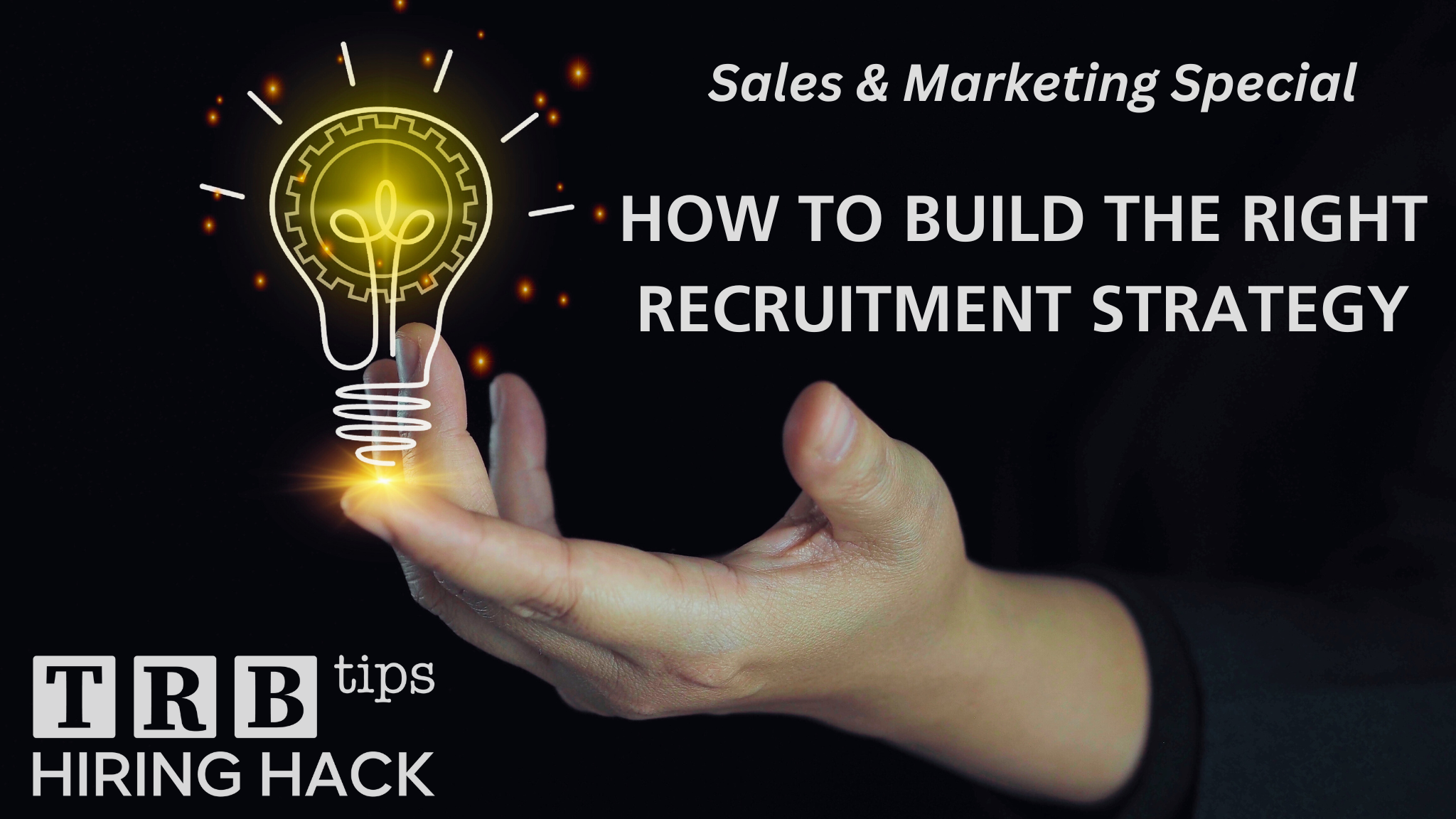How to Build the Right Recruitment Strategy – A Sales & Marketing Special
Recruiting has always been a complex process, affected by changes in candidate preferences, evolving technology, and market dynamics.
Choosing the right recruitment process for a sales or marketing role can be complex. That’s particularly true with growing skill shortages, evolving AI applications, and changing working styles, like hybrid and remote work.
However, the ideal recruitment strategy is crucial to attracting and retaining talent and cultivating a thriving workforce.
So, how do you define the process that’s right for you? Here, we’ll guide you through the pros and cons of different recruiting strategies and the steps you’ll need to take to boost your chances of hiring success.
The Groundwork: Preparing for Your Recruiting Campaign
Though access to talent is growing in some areas, particularly for companies who offer remote working options, we’re still in a skills-short market for both good sales and marketing candidates. In the past 6 years, according to data from Statistica, the global research company over half of all organisations have suffered from severe skill shortages.
The UK continues to face consistent difficulties filling skilled roles. To give yourself the best chance of attracting talent, you need two core things: an excellent employer brand and a fantastic candidate experience.
Let’s start by looking at your employer brand.
Building a Strong Employer Brand
Today, according to some recent data from LinkedIn, 88% of candidates consider a company’s employer brand when applying for a role. A powerful employer brand is what tells candidates why they should work with your company. It highlights your unique benefits, draws attention to your company culture, and helps you and your recruitment partner “market” your company.
A stronger employer brand helps you attract high-performing talent by highlighting the positive aspects of your company culture. If you deliver exceptional benefits, promote diversity, equity, and inclusion, and invest in developing your team, they will also likely stick with your company.
To make the most of your employer brand:
- Identify what candidates want: Find out what sales or marketing candidates are looking for in your market sector. Flexible working options are extremely popular, whether they include hybrid work options or flexible schedules. Consider giving your teams more freedom over their workday and exploring various unique benefits.
- Create a compelling company culture: Highlight the unique culture of your company. Draw attention to how you promote professional growth with training and development. Showcase your efforts to support diversity, equity, and inclusion, and ensure every team member feels comfortable within the workplace.
- Promote your brand: Make it easy for sales or marketing candidates to understand your employer’s value proposition. Draw attention to your employees and their success stories on your website. Highlight customer testimonials. Share insights on your social media pages, and advertise the benefits you can offer on job descriptions.
Optimising the Candidate Experience
Regardless of which recruitment process you choose for your company, your focus should always be on delivering an excellent candidate experience. Improving the candidate experience doesn’t just make candidates more likely to accept your job offers.
It’s also a good way to enhance your employer brand and make you more appealing to future candidates. Focus on things like:
- Simplifying the application process: More than 70% of candidates say they won’t submit a job application if it takes more than 15 minutes. Make the process simpler by allowing customers to sync their LinkedIn profile or upload CVs instantly.
- Communicating transparently with candidates: Give your candidates a clear view of where they are in the application process by communicating with them regularly. Let them know when you’ve received their application and when you’re reviewing it.
- Requesting feedback: Ask successful and unsuccessful candidates to share insights into what they liked and disliked about the candidate experience. This will help you to identify areas where you might need to improve.
Choosing Your Sales and Marketing Team Recruitment Process
Once you have a strong employer brand and an insight into your candidate experience, it’s time to choose your recruitment strategy. There are a few options to consider when recruiting for a sales or marketing team, all with their pros and cons.
The most common options include:
- Recruitment companies: Working with a recruitment company to outsource your hiring process to a team of dedicated and experienced professionals.
- DIY Recruitment: Use your own time and that of your team to help with the recruitment process. This would include advertising, CV screening, initial interviews, writing Job descriptions, etc.
- Internal Talent Team: Recruit an internal talent acquisition team who may still work with an external recruiter to focus exclusively on recruitment and ensure your hiring strategies align with your business goals.
Let’s explore the pros and cons of each option.
DIY Recruitment: The Pros and Cons
Smaller businesses and those with limited budgets often rely heavily on DIY recruitment. They assume the easiest way to reduce the costs of recruiting is to use the resources they already have. However, there are downsides to a DIY strategy.
Pros:
- Cost savings: DIY recruitment removes the need to hire additional employees for recruitment purposes or pay a recruitment company, making it a more budget-friendly option for smaller organisations.
- In-house control: Since you’re handling everything yourself, you get complete control over the recruitment process, from how you’ll source talent to where you’ll search for candidates and even the candidate experience.
- Direct communication: In a DIY strategy, you’ll communicate directly with candidates, which can give you a better insight into their competencies and skills, improving hiring decisions.
Cons:
- Time-consuming: Managing the whole recruitment process internally can be time-consuming and complex. There’s a lot of work to do to source, filter through, and interview candidates. You could even lose money if crucial members of your team are spending more time on recruiting than on their primary tasks.
- Limited reach: The chances are that your internal team members won’t have access to the same extensive talent networks and specialists’ resources. This could limit your ability to tap into different sales and marketing expert talent pools.
- Lacking expertise: The people you choose to be responsible for your recruiting process might not have any expertise in recruitment. They may not know how to write great job descriptions, conduct effective interviews, or connect with new talent sources.
- Understanding what makes a good sales or marketing person: Similar to the above point, will your internal recruiter have the expertise to identify a great sales or marketing person from just a great CV.
Internal Talent Team: Pros and Cons
Using an internal team involves hiring HR professionals with expertise in the recruitment world to work within your company. This gives you a similar level of control to DIY recruitment and access to some of the specialist skills you might be missing.
Pros:
- Dedicated expertise: An internal talent team brings specialist knowledge, experience, and insights to your recruitment process. They’re focused exclusively on hiring for your business and don’t have to direct their attention anywhere else.
- Alignment: Internal teams will better understand your] company culture and employee value proposition because they’re constantly exposed to it. This can make it easier for them to find the right talent for your team.
- Consistent access: Building an internal talent team means you’ll have long-term access to the recruitment professionals you need. They can help build a consistent recruitment strategy that grows with your company.
Cons:
- Resource intensive: Establishing and maintaining your internal talent team will require significant investment. You’ll need to hire HR professionals, train them on your recruitment strategies, and pay their salaries long-term.
- Limited perspectives: Because your internal team only works with your company, they may have a restricted view of the trends and patterns in the wider industry. They could be susceptible to biases and blind spots that make it harder to hire a diverse team.
- Scalability: With internal teams, you may have periods when you don’t need to hire anyone and must rapidly increase your recruitment strategy. Scaling up and down to meet those changes can be complicated.
- Sales and Marketing Recruitment Expertise: It is unlikely your internal talent team will have the experience to understand how to identify the difference between a good sales or marketing person from just a good CV.
Recruitment Company: Pros and Cons
Overall, working with a specialist sales and marketing recruitment company is currently the best way to ensure you get the talent and support you need. That’s one of the reasons up to 90% of companies use professional recruitment agencies.
While there are downsides, the benefits of working with a company can save you time and money in the long term and improve your chances of making the right hiring decisions.
Pros:
- Access to Expertise: Recruitment companies specialising in sales and marketing recruitment offer access to specialist knowledge of your industry, the talent market, and the recruitment landscape. They have pre-built networks to help with talent sourcing and can dedicate resources to help you with everything from interviewing to writing more effective job descriptions.
- Expanded Reach: Agencies spend years developing extensive candidate databases and industry connections. They can help you source active talent and passive candidates ready to explore new opportunities. They can also position your employer brand perfectly in front of candidates, boosting your chances of attracting the right people to build your team.
- Time efficiency: Outsourcing recruitment to an agency frees up your company’s internal resources, so you can focus on growing your company and profits. They’ll handle the tough parts of the recruitment process, saving you significant long-term money. They can even fill talent gaps faster than an internal or DIY team.
- Rebate and Replacement: When a placement doesn’t work out or they leave unexpectantly a reputable recruitment agency will offer you a rebate or replacement
On top of all this, recruitment companies can help you identify trends that will improve your employer branding, enhance your candidate experience, and assist you with factors like writing job descriptions and conducting interviews. They can give you the expertise and insight you need to build a future talent pipeline.
But be warned, not all recruitment businesses are the same, as a minimum you should expect a 12 Month Rebate and Replacement policy as standard.
Building the Ideal Recruitment Process
An effective recruitment process is crucial to ensuring you can develop a thriving workforce for your company. While all businesses need a strong employer brand and an excellent candidate process, various ways to approach your recruitment strategy exist.
Overall, however, working with a recruitment agency is the best way to improve your chances of achieving your recruitment goals. Their expertise, support, and reach will give you a critical edge in a skills-short market.
TRBtalent have been helping firms acquire sales and marketing talent since 2020. We have placed 100s of candidates, all with a 12 month rebate and replacement policy as standard; if you want to find out how we can help, call us on 01622 934 954 or email us at hello@trbtalent.com



